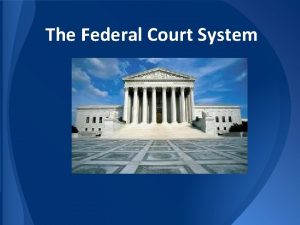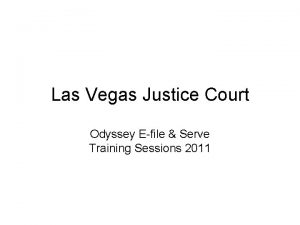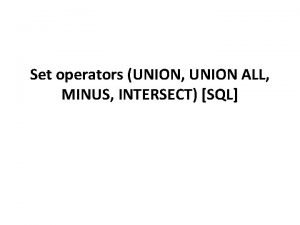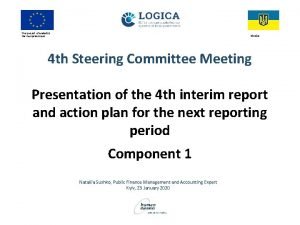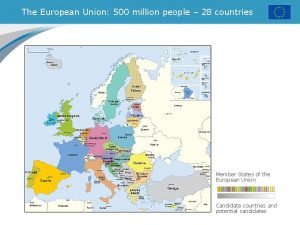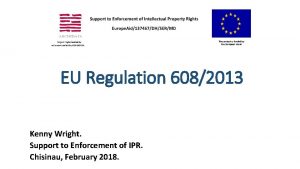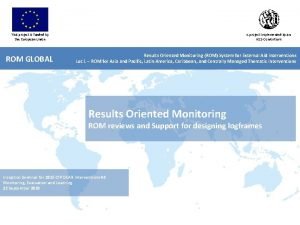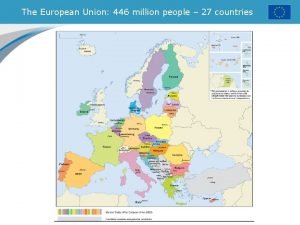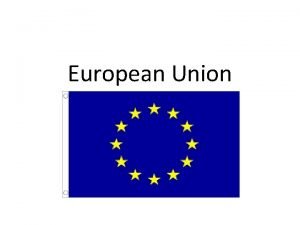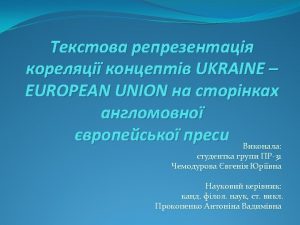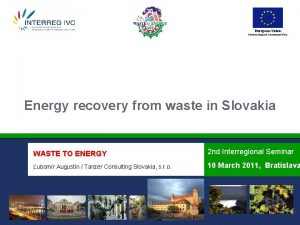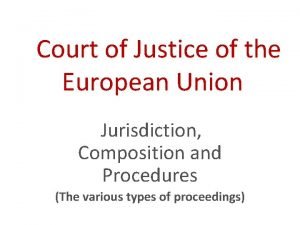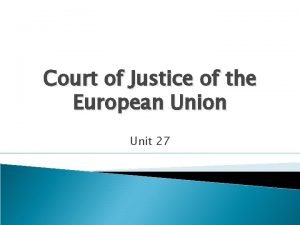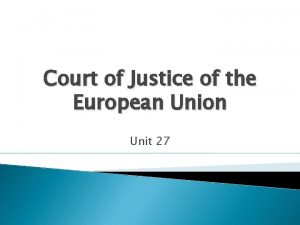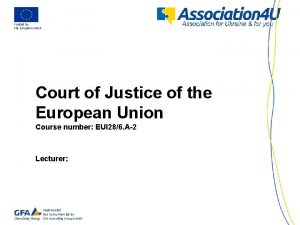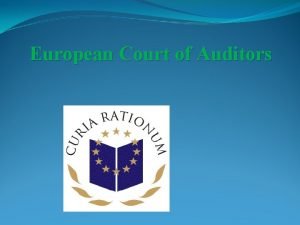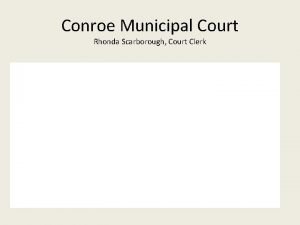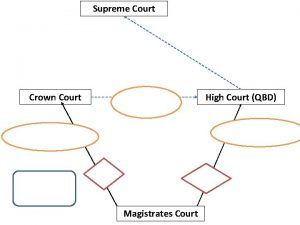The Court of Justice of the European Union












































- Slides: 44

The Court of Justice of the European Union and Its Case Law in the Area of Civil Justice Closing conference 10. 06. 2015 Jūrmala This presentation is Co-funded by the Civil Justice Programme of the European Union Project JUST/2013/JCIV/AG/4691 „The Court of Justice of the European Union and its case law in the area of civil justice”.

Plan of Presentation • Introduction – Projects – Researchers – Methodology • Conclusions and Recommendations • Summary

Introduction

Parts of the Projects 1. Research «The Court of Justice of the European Union and the Impact of Its Case Law in the Area of Civil Justice on National Judicial and Administrative Authorities» 2. Guidelines and recommendations «Effective Adoption, Transposition, Implementation and Application of the EU Legislation in the Area of Civil Justice» Original language: English!

Leading researcher: Dr. iur Inga Kačevska • Partner at Law Office of Inga Kačevska • Assistant Professor at the University of Latvia • Trainer at the Latvian Judicial Training Center • Holds LLM from Chicago Kent College of Law, Master of Orientalististics and Lawyers Diploma from University of Latvia • Author of many publications, including Research on Practical Application of EU Regulations Relating to EU Level Procedure in Civil Cases: the Experience in Baltic States co-authoring with Dr. iur Baiba Rudevska See more: www. kacevska. lv

Researcher: Dr. iur Baiba Rudevska • Independent Researcher in the field of private international law, comparative law and inter-temporal law. • Former senior lawyer at the Riga Customs Office. • Former lawyer at the Ministry of Justice of Latvia (Department of International and European Law; Courts’ Department (international judicial cooperation in civil and criminal matters)). • Topic of the Ph. D thesis: “Tendencies of Development of Recognition and Enforcement of Foreign Judgments in Civil and Commercial Matters in the European Union and the Hague Conference on Private International Law”. • Author of more than 20 publications in Latvian, English and German.

Researcher: Dr. iur Arnis Buka • Lecturer of the EU law in the Faculty of Law, University of Latvia • Lecturer at the Latvian Judicial Training Center • Author of several EU law study-books in Latvian (oldest 2001, newest 2014) • Defended the Phd thesis on topic of the problem areas of the preliminary rulings procedure • Author of many EU law-related publications in Latvian and English

Researcher: Aleksandrs Fillers, LLM • Ph. D student at the University of Latvia • Holds an LLM in International Commercial Arbitration from Stockholm University and Master Degrees from Strasbourg University and University of Latvia • Author of many publications on topics of international commercial arbitration, international trade law and Latvian private law in Latvian and English

Researcher: Mārtiņš Dambergs, Ph. D st. • Senior Associate in Law Office of Inga Kačevska • 3 rd year Ph. D student in the University of Latvia. Topic of Ph. D thesis: “Discovery and evidence in international commercial arbitration” • Independent Researcher in the field of private international law, Latvian private law and international arbitration • Author of many publications on topics of international commercial arbitration, international trade law and Latvian private law in Latvian and English

Methodology

Member States where the studies took place • LATVIA • HUNGARY • THE UNITED KINGDOM • GERMANY • SWEDEN

Sources for the Projects • 15 Regulations • 2 Directives • 7 Proposals • CJEU case law + ECt. HR case law • Case law of the national courts and administrative authorities

Challenges of the Projects • Timing: 14 August 2014 - 31 December 2014 (Research) and 1 March 2015 (Recommendations) • Numerous legal acts and the case law of CJEU to evaluate • Limited availability of case law (Hungary, Sweden) • Too many cases (the U. K. , Germany)

Aims of the Research: • influence and the practical application of the case law of the CJEU in civil matters in decisions and judgments of national courts and in national legal acts; • assert the problems and offer solutions and proposals for more effective and more frequent application of the case law of the CJEU in national courts and authorities as well as to analyze and to promote the feedback between the case law of the CJEU and national case-law and legal acts.

Plan of the Research • Summary • Introductory part: Practice of the National Courts in Application of the Case law of CJEU: General Issues • Part I: Practice of Respective National Courts in Applying Case Law of CJEU: Special Issues • Part II: Practice of National Administrative Authorities in Application of Case Law of CJEU in Area of Civil Justice • Annexes

Aims of the Recommendations • remove the obstacles of a genuine EU civil justice area by analyzing the implementation and the transposition of EU legislation in civil justice area in national legislation; • improve the exchange of information and best practices between judicial and administrative authorities focusing on practical application of EU and national legislation; • develop Guidelines and Recommendations on the most effective methods of implementation and transposition of EU legislation in national legislation.

Plan of the Recommendations • Introduction • Part I: Application of EU Law in the Area of Civil Justice • Part II: Adoption, Transposition and Control Over Transposition of EU Law in the Area of Civil Justice • Conclusive Remarks • Annexes

Presentation of Main Conclusions and Recommendations of the Projects

Application of EU Law and ECJ case law in the Area of Civil Justice

Overview on the Application • Mostly applied by courts instead of administrative authorities • Most applied instrument - the Brussels I regulation • The most requests for preliminary rulings in this area - from German courts • The entry in force of the Lisbon treaty had substantial impact on the requests for the preliminary rulings in this area 20

Problems: the Level of the Application of the EU Law • Awareness of the EU law dimension and ability to work with the EU law • Use of the CJEU case law in the process of the application of the EU law 21

Problems: the EU Level • Fragmentation of the EU law • Complicated nature of the EU law • Length of the preliminary rulings procedure • Influence of political compromises on the quality of the EU legal acts • Multitude of the official languages and translation 22

The Routes for Possible Improvements • Unification and simplification of the EU law? • Regular courses on the EU law subjects (focusing on specifics of each Member State)? • Specialization of judges? • Creation of judicial networks within single Member State? • Increased usage of the corrigendum procedure? • Participation of national judges in the EU legislative process? 23

Determination of the scope of the regulations: • - Geographical scope (ratione loci) • - Material scope (ratione materiae) • - Temporal scope (ratione temporis)

Autonomous interpretation and its impact upon the national courts : • - Result of the survey: 57, 89% of respondents have difficulties with the autonomous interpretation • - What is autonomous interpretation ? • - What is the meaning of autonomous interpretation ? • - How the autonomous notions and their definitions are made ? • - National judge v. autonomous interpretation

Calculation of time-limits: • - Autonomous time-limits in EU (see in the regulations) • - Autonomous way of calculation of these timelimits: Regulation No 1182/71 of the Council of 3 June 1971 determining the rules applicable to periods, dates and time limits (see recitals of the regulations) • - When is it possible to calculate the time-limits according to the national legal rules ?

Application of EU Law and ECJ case law in the Respective Member States: Main Issues

Jurisdiction

Main issues • Sources to determine cross-border jurisdiction • Application of the Brussels I un Ibis Regulation – Knowledge – Schema of application • A few issues in the national court practice – Contracts with consumers – Interim measures – Arbitration exclusion • The latest case law of CJEU

Conflict of Laws

Conflict of Laws (I) • Rare application of conflict of laws rules • Limited amount of the CJEU case-law on Rome I and Rome II Regulations • Limited amount of national case-law • Comparatively, less developed and less accessible literature on Rome I, Rome II and, particularly, Rome III regulation • Uncertainties regarding ex officio (sua sponte) application of conflict of laws rules: • Analysis of the problem in the light of Article 3 of Rome I and Article 14 of Rome II Regulations • Conflict of laws as procedural law • Lack of well-developed doctrines in certain Member States

Conflict of Laws (II) • Autonomy of EU conflict of laws rules: • EU conflict of laws rules are interpreted autonomously from national legal concepts • National legal concepts are interpreted autonomously from EU conflict of laws rules • Interaction between EU conflict of laws rules and other EU private international law instruments: • Relations between Brussels Ibis Regulation and Rome II Regulations

Insolvency

Insolvency (I) • New European Insolvency Regulation (28/05/2015) • General awareness of the EIR • Determination of COMI – 50% of respondents have encountered difficulties with the autonomous interpretation of COMI – C-341/04 Eurofood IFSC Ltd

Insolvency (II) • Determination of COMI of natural persons – UK/LV/SE practice – “insolvency tourism” • Jurisdiction in recovery actions – C-328/12 Ralph Schmid v Lilly Hertel (2014) – C-295/13 H v H. K. (2014) – C-157/13 Nickel & Goeldner Spedition Gmb. H v «Kintra» UAB (2014)

Service of Documents

Regulation No 1393/2007 or Service of Documents Regulation : • The Regulation has been interpreted only in 6 CJEU judgments • Two judgments have been delivered according to the reference for a preliminary ruling made by German courts • There are not many domestic cases based on the CJEU judgments • Domestic courts interpret the Regulation themselves

Language of the judicial documents and the service of these documents : • Art. 8 of the Service of Documents Regulation • The Leffler case (CJEU judgment of 8 November 2005) • The Weiss case (CJEU judgment of 8 May 2008) + case law of the German courts (example of the District Court in Bonn)

Application of the Service of Documents Regulation: the main problems: • Problem of establishing the adresses of natural persons: • - EU Member States where there are special adress registers (Germany, Latvia) • - EU Member States where there are no special adress registers (the U. K. , France) • - EU Member States where the courts are not obliged to search the adresses of the parties (the U. K. , France, the Netherlands)

Application of the Service of Documents Regulation: possibilities for resolution: • - Using e-mail adresses for the service of documents • - Creation of EU address register (the U. K. is sceptical) • - A European notion of „receipt“ could be introduced

Recognition and Enforcement of Foreign Judgments

Main problems : • Understanding of the concept of „public policy“ • Recognition and enforcement of default judgments • Understanding and integration of concepts of Common Law into the Latvian legal system • Human rights questions and recognition and enforcement of judgments

Summary • Hope – that the Research and Recommendations will be useful material • Thanks to all involved! • Any questions?

Thank you for your attention! www. kacevska. lv
 Is there a basketball court above the supreme court
Is there a basketball court above the supreme court Us circuit court map
Us circuit court map Odyssey efile nv
Odyssey efile nv Usje national office
Usje national office European human rights moot court competition
European human rights moot court competition European court of auditors internship
European court of auditors internship Intersect and minus in sql
Intersect and minus in sql Borchert model ap human geography
Borchert model ap human geography 1993 europa
1993 europa This project is funded by the european union
This project is funded by the european union European union 28 countries
European union 28 countries This project is funded by the european union
This project is funded by the european union This project is funded by the european union
This project is funded by the european union European union institutions
European union institutions This project is funded by the european union
This project is funded by the european union European union 28 countries
European union 28 countries European taekwondo union
European taekwondo union This project is funded by the european union
This project is funded by the european union Co-funded by the erasmus+ programme of the european union
Co-funded by the erasmus+ programme of the european union This project is co-funded by the european union
This project is co-funded by the european union European union military
European union military Eureka european union
Eureka european union Giorgi kacharava
Giorgi kacharava Co-funded by the erasmus+ programme of the european union
Co-funded by the erasmus+ programme of the european union Co-funded by the erasmus+ programme of the european union
Co-funded by the erasmus+ programme of the european union Https://europa.eu/european-union/index_en
Https://europa.eu/european-union/index_en Công thức tính thế năng
Công thức tính thế năng Thế nào là mạng điện lắp đặt kiểu nổi
Thế nào là mạng điện lắp đặt kiểu nổi Hình ảnh bộ gõ cơ thể búng tay
Hình ảnh bộ gõ cơ thể búng tay Lời thề hippocrates
Lời thề hippocrates Dot
Dot Vẽ hình chiếu đứng bằng cạnh của vật thể
Vẽ hình chiếu đứng bằng cạnh của vật thể Phản ứng thế ankan
Phản ứng thế ankan Các môn thể thao bắt đầu bằng tiếng nhảy
Các môn thể thao bắt đầu bằng tiếng nhảy Sự nuôi và dạy con của hổ
Sự nuôi và dạy con của hổ điện thế nghỉ
điện thế nghỉ Một số thể thơ truyền thống
Một số thể thơ truyền thống Biện pháp chống mỏi cơ
Biện pháp chống mỏi cơ Trời xanh đây là của chúng ta thể thơ
Trời xanh đây là của chúng ta thể thơ Voi kéo gỗ như thế nào
Voi kéo gỗ như thế nào Ng-html
Ng-html Số.nguyên tố
Số.nguyên tố Thiếu nhi thế giới liên hoan
Thiếu nhi thế giới liên hoan Tia chieu sa te
Tia chieu sa te Các châu lục và đại dương trên thế giới
Các châu lục và đại dương trên thế giới

